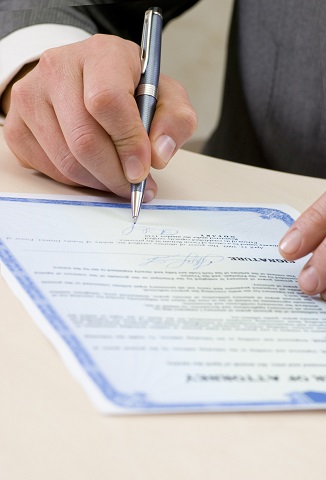Milwaukee Power of Attorney Lawyers

Before you sign power of attorney forms, make sure you're certain of the scope of the powers granted.
Put Your Future in the Right Hands
When planning for the future, having a trusted power of attorney is essential to ensure your wishes are carried out. The attorneys at Niebler Pyzyk in Milwaukee specialize in helping clients establish comprehensive power of attorney arrangements. With our expertise, you’ll have peace of mind knowing your affairs will be properly managed should you become incapacitated.
Contact Power of Attorney Lawyers
Hire Niebler Pyzyk Lawyers for Granting Power of Attorney
Our experienced attorneys can help you with powers of attorney for:
- Health care
- Finances
- Real estate
- Parents and children
- Vehicle transactions
The governing Powers of attorney have changed significantly over the last 75 years, and Niebler Pyzyk understands and can help navigate these changes effectively. We offer comprehensive estate planning legal services and can help you protect your loved ones after death and prepare for a future of financial security.
What is a Power of Attorney?
When granted Power of Attorney, the agent (typically a trusted family member or close friend) has the authority to make decisions in certain matters on behalf of the signing individual (the principal). A power of attorney (POA) is a legal document allowing the principal to appoint an agent to manage his or her affairs.
A POA is created to deal with situations where the principal cannot make financial or medical decisions due to an incapacity (typically brought on by health complications) and needs a trusted individual whom they have appointed as their agent to act on their behalf.
How Do Powers of Attorney Work?
- Duty of the Agent: The agent has a duty to act in the best interest of the principal. They are not permitted to change or transfer their power of attorney or alter the principal's will.
- Termination: Power of attorney ends upon the death of the principal, meaning the agent cannot continue to make decisions on behalf of the deceased unless they were also named personal representative or executor of the will. If the principal dies without a will, the agent may petition for the role of estate administrator or personal representative.
- Agent Resignation: An agent can quit their role at any time but cannot designate a new agent to take over their responsibilities.
The 4 Types of Power of Attorney

A POA allows you to decide in advance who you would like making decisions on your behalf if you become incapacitated.
- Limited power of attorney: This type of power of attorney grants someone the authority to act on your behalf for a specific purpose or transaction.
- General power of attorney: A general power of attorney authorizes someone to handle almost any of your legal and financial affairs, making it a very broad delegation of authority.
- Durable power of attorney: Even if you become incapacitated, a durable power of attorney remains in effect, allowing your designated agent to continue acting on your behalf.
- Springing power of attorney: This type only takes effect upon the occurrence of a specific event, such as you becoming incapacitated, as determined by the criteria you outline.
Reasons You Need a Power of Attorney
1. Plan for Transitioning Your Finances
Depending on the powers granted through the POA, a financial power of attorney typically allows the agent to access the principal’s accounts, make financial decisions, file taxes, collect debts, manage property, apply for public benefits and pay bills on behalf of the principal.
2. Prepare for Health Emergencies
A medical power of attorney (sometimes called healthcare POA) typically grants the agent the ability to choose what medical care is given, which doctors and medical professionals are used, where the principal lives or receives care and even what the principal eats. Decisions involving healthcare expenses are dependent on the financial resources of the principal and require approval by the financial agent if not the same person.
In many cases, one agent will have power of attorney for both healthcare and financial decisions, though it is sometimes wiser to name separate people as the agents under the financial and healthcare powers of attorney. A Niebler Pyzyk estate planning attorney will discuss your power of attorney needs, answer your questions and draft suitable powers of attorney to protect, apply for public benefits and pay bills on behalf of the principal.
3. Prevent Family Conflict
Without legal documentation spelling out your wishes, disagreements can arise among family members about your care or finances if you become incapacitated. A power of attorney prevents these conflicts by designating a specific person to represent your best interests.
4. Avoid a Conservatorship
If you become mentally incapacitated without naming a power of attorney, the court may appoint a conservator to oversee your affairs - a time-consuming and costly process. Naming a power of attorney yourself avoids this by allowing your chosen representative to immediately make decisions on your behalf.
Do I Need a Lawyer for Power of Attorney?
Wisconsin power of attorney form templates are widely available online, however, we urge our clients not to make a power of attorney by themselves. Some of the powers granted through a POA are automatically included in these form documents while others must be explicitly spelled out.
An experienced estate planning attorney will ensure you appropriately execute the POA and that you fully understand its terms and the powers that have been granted to the agent in the event the POA is activated. The exact powers of attorney for a given agent may be broad or specific, depending on how the POA document is created.
Trusted Law Firm for Power of Attorney Rights in Wisconsin
We serve the greater Milwaukee area from our convenient Menomonee Falls location including Waukesha, Brookfield, Glendale, Mequon, Germantown, Grafton, Cedarburg, Wauwatosa, Hartland, Pewaukee, Sussex, New Berlin, West Allis, West Bend, Port Washington & the surrounding communities.
Power of Attorney FAQs
Do I need a lawyer for power of attorney in Wisconsin?
While not strictly required, we recommend you have a lawyer draft your power of attorney documents to ensure they are valid and your wishes are properly expressed.
Who can be named a power of attorney in Wisconsin?
In Wisconsin, you can name any competent adult as your power of attorney agent, such as a family member, friend or professional you trust.
What authority to act does my power of attorney have?
The scope of authority granted to your power of attorney agent is determined by the powers you specify in the legal document itself. This could range from limited financial transactions to broad decision-making power.
How does a power of attorney differ from a guardianship?
A power of attorney is established voluntarily by you while you are still legally competent. A guardianship is a court-appointed arrangement if you become incapacitated without naming an agent.